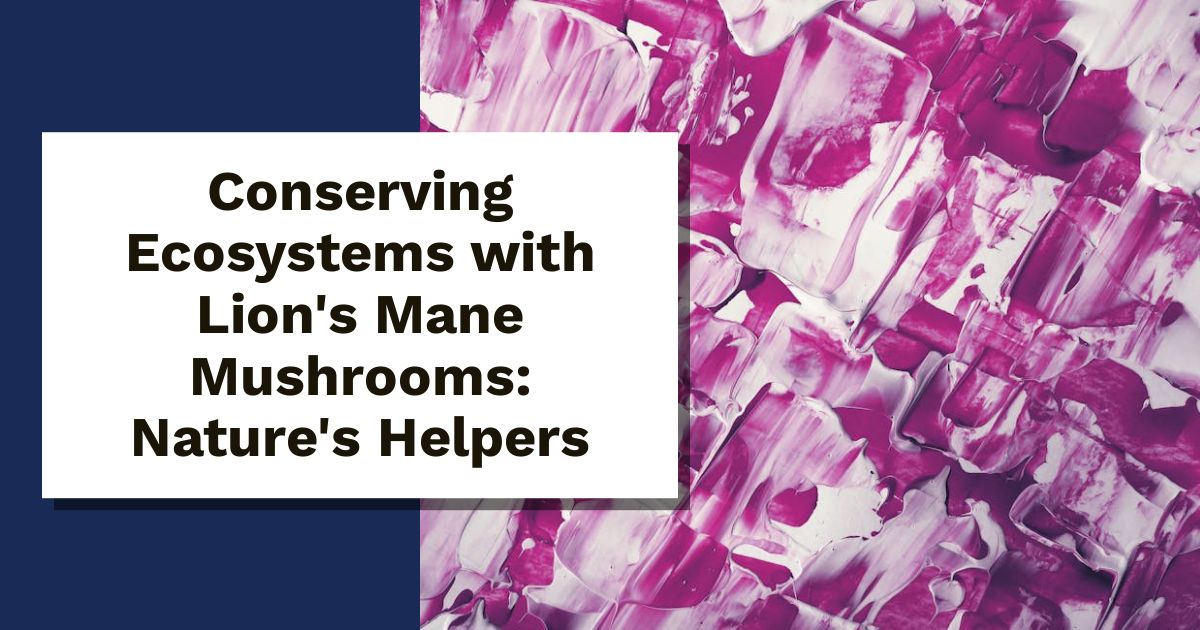Imagine a world where mushrooms play a key role in saving our ecosystems. Lion’s Mane mushrooms aren’t just delicious; they bring a host of benefits that help our environment thrive.
These unique fungi work as nature’s builders, improving soil health and promoting biodiversity. They break down dead material, enriching the earth with nutrients. This post dives into how Lion’s Mane mushrooms can be a simple yet effective ally in conservation efforts.
Join us as we uncover their amazing attributes and learn how these mushrooms can help keep our ecosystems vibrant. You’ll discover tips on growing them and the ways they directly impact our planet. Get ready to explore the magic of Lion’s Mane and its role in nurturing the earth!
What Are Lion’s Mane Mushrooms?
Lion’s Mane mushrooms have a distinctive charm that sets them apart from the myriad of fungi in the forest. Their unique appearance and ecological preferences not only make them fascinating but also crucial in understanding their role in ecosystems.
Physical Features
Lion’s Mane mushrooms (Hericium erinaceus) are hard to miss! They boast a fuzzy, white exterior resembling a lion’s mane, with long, cascading spines that dangle like icicles from the fruiting body. This mushroom typically grows in large, rounded clusters, creating a fluffy spectacle that’s as eye-catching as it is intriguing. Unlike traditional mushrooms that have caps and stems, Lion’s Mane appears more like a pom-pom. They can vary in size, generally ranging from 10 to 25 centimeters in diameter. Their unusual shape and texture not only make them appealing for culinary use but also help differentiate them from other mushroom varieties. For a detailed look at their characteristics, check out this guide.
Habitat
Lion’s Mane mushrooms thrive in specific environments. They prefer to grow on decaying hardwood, particularly among trees like oak, beech, and maple. You can often find these mushrooms in forests, rotting logs, or on the trunks of living trees. They flourish in areas with high humidity and tend to appear in late summer to early fall. The decomposition process they contribute to allows them to play a significant role in nutrient cycling. This not only helps their own growth but enhances the health of the forest ecosystem. To explore more about where you might find Lion’s Mane, visit this resource.
The Role of Lion’s Mane in Ecosystems
Lion’s Mane mushrooms are not just edible; they play important roles in maintaining healthy ecosystems. From recycling nutrients to supporting biodiversity, these fungi have a unique position in nature. Let’s explore how Lion’s Mane contributes to its environment.
Nutrient Cycling
Lion’s Mane mushrooms excel at nutrient cycling in forests. As saprophytic fungi, they thrive on decaying organic matter. By decomposing dead wood and plant material, Lion’s Mane transforms these materials into rich nutrients that benefit the soil. This process is crucial for forest health, allowing plants to access essential elements like nitrogen and phosphorus more efficiently.
- Decomposition: Lion’s Mane helps break down dead trees, returning vital nutrients to the earth.
- Soil Fertility: The mushrooms facilitate the replenishment of the forest floor, boosting soil nutrient levels and supporting new plant growth.
- Ecosystem Balance: Healthy soil supports diverse plant species, which in turn sustain various animal life.
Check out more about this process here.
Supporting Biodiversity
The presence of Lion’s Mane mushrooms really helps other species thrive. These fungi are part of a larger web of life in forests. By creating habitats and providing food, they support many organisms, from insects to larger mammals.
- Connection to Other Species: Lion’s Mane acts as a food source for various forest inhabitants. Insects, small mammals, and even larger species rely on these fungi.
- Ecosystem Interactions: Their interaction with other flora promotes a healthy balance, allowing different species to coexist.
- Resistance to Disease: By enhancing soil health, these mushrooms help plants resist diseases, promoting overall ecosystem resilience.
Learn more about how mushrooms like Lion’s Mane impact biodiversity here.
Mycelium Magic
Mycelium, the part of the fungus hidden underground, is where the real magic happens. It connects plants and other organisms, forming an intricate network that enhances nutrient and information exchange in ecosystems.
- Communication Hub: Mycelium allows plants to share resources and warn each other of threats, like pests or diseases.
- Nutrient Sharing: Through mycelial connections, plants can access nutrients from a wider area, fostering greater plant health.
- Soil Structure: This fungal network also helps improve soil structure, enhancing its ability to retain water and nutrients.
Discover how mycelium operates as an ecosystem’s underworld here.
Conservation Efforts with Lion’s Mane
Lion’s Mane mushrooms serve not just as tasty treats but also as valuable allies in conservation. Their unique properties allow for various efforts that protect habitats and rejuvenate ecosystems. Here’s how we can harness their power for a sustainable future.
Sustainable Harvesting Practices
Sustainable harvesting is essential for protecting Lion’s Mane habitats. When gathering these mushrooms, a few key practices should be followed:
- Harvest Responsibly: Cut the mushrooms at ground level using a sharp knife. This minimizes damage to the surrounding mycelium and allows future growth.
- Leave No Trace: Only take what you need from a patch and leave at least half of it behind. This helps maintain healthy populations.
- Choose the Right Time: Harvest during peak growth periods, usually in late summer to early fall, to ensure the mushrooms are thriving.
For more tips on sustainable harvesting, check this guide.
Restoration Projects
Lion’s Mane mushrooms have found a niche in restoration projects aimed at revitalizing ecosystems. These efforts demonstrate their effectiveness in restoring balance to nature:
- Soil Enrichment: By breaking down organic matter, Lion’s Mane adds nutrients back into the soil, improving fertility.
- Wildlife Habitat: The mushrooms create microhabitats that support various species, encouraging biodiversity.
- Farm-to-Fungi Initiatives: Some projects, like the Transfarmation Project, transition traditional farming practices to fungi production, promoting sustainability.
Engaging with these restoration projects can help reconnect people with nature while supporting ecosystem health.
Community Involvement
Local communities play a crucial role in the success of conservation initiatives involving Lion’s Mane. Here’s how everyone can pitch in:
- Education and Workshops: Communities can organize mushroom foraging classes that teach sustainable practices and the importance of fungi in ecosystems.
- Support Local Growers: Purchasing from local farms that practice sustainable methods helps boost the economy and conserves resources. Check out how organizations like Community Helps Itself cultivate Lion’s Mane sustainably.
- Scientific Engagement: Join initiatives like the Fungal Diversity Survey, which encourages community members to participate in mycology research and conservation efforts.
By involving more people in conservation efforts, we strengthen our ties to nature and create a sustainable path forward with Lion’s Mane mushrooms as our allies.
Health Benefits of Lion’s Mane
Lion’s Mane mushrooms are more than just culinary delights; they pack a punch when it comes to health benefits. From enhancing brain function to fighting inflammation, these mushrooms contribute significantly to our well-being and the environment. Let’s break down the specific advantages.
Cognitive Boost
Lion’s Mane can give your brain an impressive upgrade. This mushroom contains two unique compounds, hericenones and erinacines, which stimulate the growth of nerve cells. They may help improve memory and cognitive function, making it easier to stay sharp as we age.
Research suggests that Lion’s Mane may even guard against dementia and reduce anxiety and depression symptoms. Imagine being able to support your mental clarity while enjoying a tasty mushroom dish! For more about its cognitive benefits, check out this WebMD article and an insightful Healthline piece.
Anti-Inflammatory Properties
Inflammation can be a hidden enemy, leading to various health issues. Lion’s Mane mushrooms have anti-inflammatory qualities that may help alleviate symptoms related to chronic conditions.
By reducing inflammation, these fungi can support gut health and immune function. For instance, they might be helpful for those dealing with inflammatory bowel disease. Curious to see how they work their magic? Explore findings from this Verywell Health article and this Medical News Today article.
Sustainable Food Source
Eating Lion’s Mane mushrooms isn’t just good for your health; it can also benefit the planet. These mushrooms have a low carbon footprint when cultivated. They grow efficiently on various waste materials, making them a sustainable food source.
By choosing to consume Lion’s Mane, you’re not only enhancing your health but supporting sustainable agriculture practices. Students at U-M students are growing mushrooms showcase how urban agriculture can shift towards more eco-friendly methods. For more about sustainable practices in mushroom cultivation, check this Shroomeats blog.
Embracing Lion’s Mane mushrooms means you’re nurturing both your body and the environment. What could be better than that?
How You Can Help
Conservation isn’t just for scientists or dedicated environmentalists; it’s for everyone! From getting involved in local efforts to growing your own Lion’s Mane mushrooms at home, there are many ways you can make a difference. Let’s explore the avenues through which you can contribute to conserving ecosystems with Lion’s Mane mushrooms.
Get Involved with Local Conservation
Connecting with local conservation groups is a fantastic way to support environmental efforts. These organizations often look for volunteers to help with various projects, from tree planting to educational outreach. Here are some places to start:
- Find a group near you: Many regions have local chapters of national organizations like The Nature Conservancy, which works to protect land and water.
- Join community events: Participate in clean-ups, educational programs, or workshops to learn more about ecosystem health.
- Collaborate with schools: Partner with schools to promote awareness about the importance of conserving natural habitats.
You can explore an extensive list of conservation organizations here.
Grow Your Own Lion’s Mane
Cultivating Lion’s Mane mushrooms at home can be a rewarding venture. Not only do you get fresh fungi for your culinary creations, but it also promotes sustainability. Here are some steps to get you started:
- Gather materials: You’ll need hardwood pellets or sawdust, and a suitable container for growing.
- Inoculate: Mix the substrate with Lion’s Mane mushroom spawn. This introduces the mycelium needed for growth.
- Create the right environment: Maintain humidity levels and provide indirect sunlight to encourage growth.
- Harvest: After a few weeks, your mushrooms will be ready to pick. Cut them carefully to ensure future growth.
For detailed guidance, check out this step-by-step guide.
Spread the Word
Knowledge is power! Sharing what you learn about Lion’s Mane mushrooms and conservation can inspire others. Here are some creative ways to spread the word:
- Host a workshop: Get friends or community members together to learn about Lion’s Mane mushrooms and their ecological benefits.
- Use social media: Share your growing experience, interesting facts, or even recipes using Lion’s Mane mushrooms on platforms like Instagram or Facebook.
- Write a blog or article: Share your insights on local conservation groups, home cultivation practices, and the environmental impact of mushrooms.
- Educate others: Distribute pamphlets or materials at local events, highlighting the benefits of Lion’s Mane mushrooms in ecosystems.
You can find resources and information to help inspire your messaging on sites like HerbRally or the Weekly “What is it?” blog.
Every action counts, and with Lion’s Mane mushrooms as your allies, you’re equipped to make a positive impact.
Conclusion
Lion’s Mane mushrooms offer much more than flavor; they are essential for ecosystem health. By improving soil quality and boosting biodiversity, these fungi act as nature’s allies.
Engaging in sustainable practices, exploring restoration projects, and cultivating these mushrooms at home can all contribute to conservation efforts.
As we rediscover the power of Lion’s Mane, we can create a healthier environment for ourselves and future generations. What steps will you take to support our ecosystems with these remarkable mushrooms?
Dr. Cordy is a passionate advocate for the incredible benefits of Lion's Mane mushrooms, blending scientific insight with a deep enthusiasm for natural wellness. When he’s not exploring the latest research on functional fungi, you’ll find him chasing waves as an avid surfer, strategizing over chess matches, or embarking on outdoor adventures that fuel his curiosity and love for nature. A devoted dog dad and lifelong explorer, Dr. Cordy combines his diverse passions with a mission to educate and inspire others about the transformative potential of Lion’s Mane mushrooms. You can unearth his latest Lion's Mane insights here. 🍄


